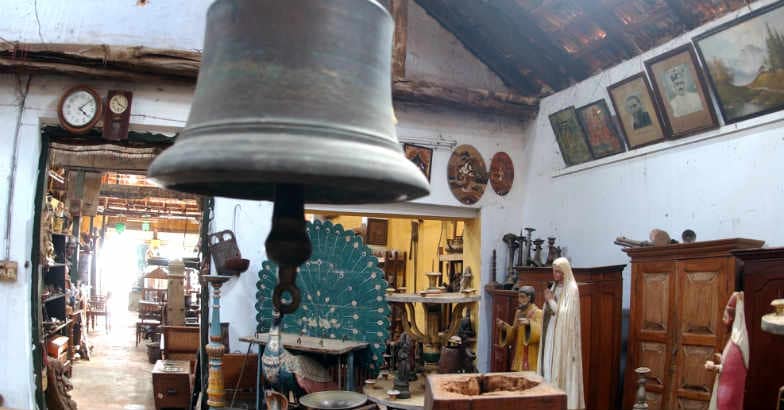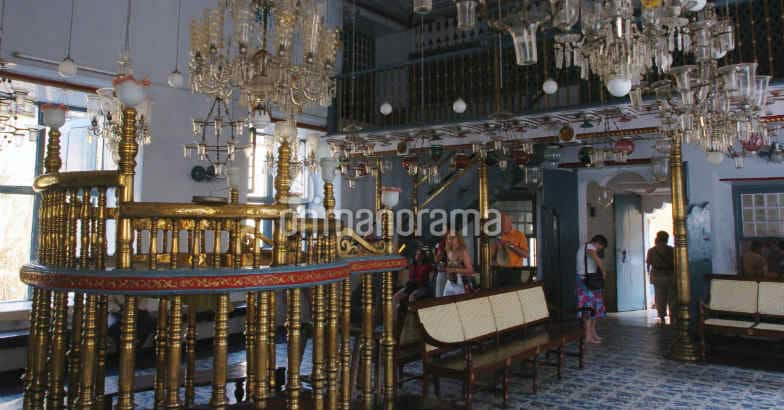From Israel to Mattancherry’s Jew Street - a walk into the past

Mail This Article
Everything on Mattancherry’s congested Jew Street was reminiscent of their childhood to Jacob Ben Eliyahu and friends. Some of those buildings, which are now part of Kochi's heritage zone, were once part of their life. Half a kilometer away was the Jewish cemetery bearing the history of his kith and kin for whom Kerala meant more than Israel.
Jacob Ben Eliyahu and his family left India’s shores for their home in Israel more than half a century ago, leaving their hearts behind. Eliyahu, though every bit an Israelite now, still clings on to his love for the land he was born in, raised, and finally had to leave. Malayalam, Kerala, and its culture mean a lot to him and that's the feeling which inspired him to make this journey.
This time, unlike his previous visit to Kochi in 2006, Eliyahu is accompanied by relatives Benal Ezra and wife Miriam, Elias Thifrath and friend Nehemiah Gilad. For 73-year-old Eliyahu, it’s yet another round of old-time backslapping camaraderie.
Old times
On learning that he was coming, Ben’s old friends rushing to meet him. Old St Albertian schoolmates Francis George, Rajan Kuruvilla, K P Skandan, P R John and a whole bunch of old boys got together in Mattancherry. Ben also found time to check in on another old friend Chandramohan, a Cochin Port retiree. He did not forget to catch up with the grand old lady of Mattancherry, 95-year-old Sarah Cohen, the oldest living Jew in Kochi and also one among the last five Jews residing in Mattancherry.

His next trip down memory lane was to Mala, Paravoor and Chendamangalam which were all Jewish towns once and where the heritage of its people still lingers.
Every bit of Eliyahu turns nostalgic as he recounts the Law College days. He was reading law when the family decided to migrate. Jacob Ben was barely 24 when he went back to the Promised Land. It was the beginning of a new phase, but there never was a goodbye to the old.
Always Kerala

Esther, his wife, had also migrated to Israel from Kochi much before him. Esther, who touched base in her new home when she was but a six-month-old baby, knows no Malayalam, but has made valiant efforts to learn a bit. His kids and grandkids too, though unfamiliar with Malayalam, have shown keen interest in learning the basics. Eliyahu has promised to be back in Kochi next year with his children and grandchildren, to introduce them a land he holds close to his heart, his friends and the fading heritage of a once flourishing culture which Kerala is striving to keep.
Eliyahu used to regularly write to his friends in Malayalam. That’s how he kept in touch with them. The frequency of letters came down when the phone took its place. Eliyahu still reads Malayalam books and magazines whenever he manages to get them. He is in fact one of the few Indian Israelis who subscribes to the Malayala Manorama in Israel.
An economics graduate from St Albert’s College, Kochi, Eliyahu went on to work as librarian in one of the technical universities in Israel.
While most immigrants from Kerala speak Hebrew at home once in Israel, the food mostly is what’s on Kerala’s traditional menu. But once they dine out, it’s Jewish food that’s asked for. Eliyahu's Israeli daughter-in-law too loves her food Indian style. Jews are very hospitable and love to invite friends and families across and treat them to the best of dishes.
Puthiyaparambil Francis George, a friend of Eliyahu recalls the grand reception he got when he visited Israel. Eliyahu waited for George for a whole day at the city centre with a gift for him.
In Kochi, Eliyahu and his friends from Israel were treated to traditional Jewish food by Queenie Hallegua, one of the trustees of the Jewish Synagogue in Mattancherry. Whenever somebody goes over to Israel from Kerala or India, Jacob Ben swells with pride and joy. One such visit was that of Prime Minister Narendra Modi who went on a milestone trip to Israel recently.
Why to Israel?
Eliyahu says it was two prominent factors which compelled his parents to go to Israel. Custom has it that if you need to hold worship in the synagogue, the presence of at least 10 members is a must. As the numbers fell, more often than not, worship had to be canceled. As the migration of Indian Jews swelled, it was difficult to observe many of the old rituals. Apart from all this, it was impossible to observe the Sabbath on Saturday, as most offices and workplaces were open on all Saturdays in Kerala. It was against this shift in customs and rituals that Eliyahu’s parents decided to move to Israel. Eliyahu is happy that he got a chance this time to offer worship at the synagogue along with his friends.
Eliyahu’s dictionary
It’s heartening to know the immense efforts Eliyahu and his contemporaries are putting into teaching Malayalam to the new generation. He has a four-column dictionary for those who wants to learn Malayalam. The first column carries Malayalam words written in English with the second column carrying their Malayalam pronunciation in Hebrew. The third column has the Malayalam word and corresponding Hebrew word in the fourth.
The youngsters listen to the elders conversing in Malayalam and many have expressed interest in learning the language. While the first edition of the dictionary was published in Israel, Eliyahu hopes to bring out the second in Kerala. He had written to the Bhasha Institute director and the Secretary for Cultural Affairs in this regard. The Bhasha Institute authorities have expressed interest in Eliyahu's dictionary.
The roads are terrible!
Everything, except Kerala’s roads, can be described in superlatives. The roads are terrible, said Benal Ezra who left Kochi for Israel 50 years ago. When much can be sung about Kerala’s scenic beauty, the state of the roads is pathetic. His holiday trips to Munnar and Vagamon almost left him with a broken back, he said.
Something that pained the old boys was motorists’ lack of respect for pedestrians. Zebra crossings go for a toss as people struggle to cross the roads. Such violations and rude motoring styles can take place only in India, said Eliyahu.

